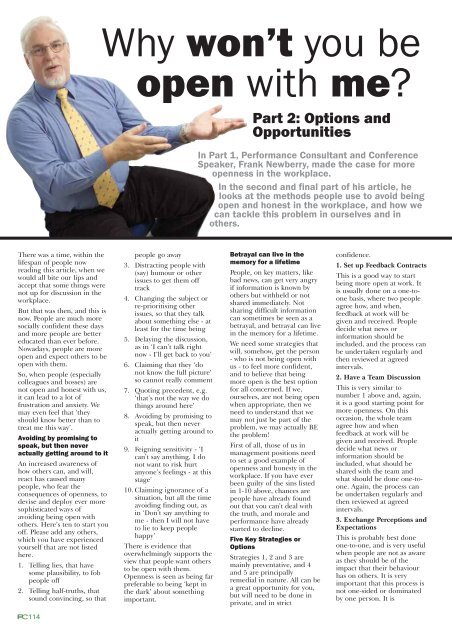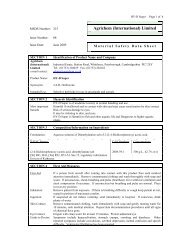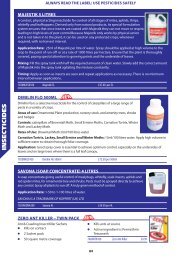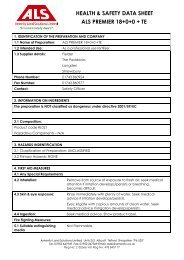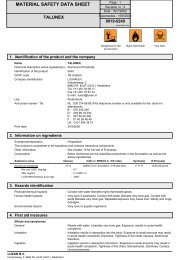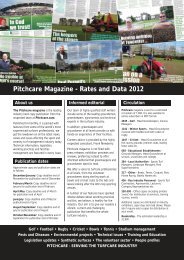Earning his Spurs - Pitchcare
Earning his Spurs - Pitchcare
Earning his Spurs - Pitchcare
You also want an ePaper? Increase the reach of your titles
YUMPU automatically turns print PDFs into web optimized ePapers that Google loves.
There was a time, within the<br />
lifespan of people now<br />
reading t<strong>his</strong> article, when we<br />
would all bite our lips and<br />
accept that some things were<br />
not up for discussion in the<br />
workplace.<br />
But that was then, and t<strong>his</strong> is<br />
now. People are much more<br />
socially confident these days<br />
and more people are better<br />
educated than ever before.<br />
Nowadays, people are more<br />
open and expect others to be<br />
open with them.<br />
So, when people (especially<br />
colleagues and bosses) are<br />
not open and honest with us,<br />
it can lead to a lot of<br />
frustration and anxiety. We<br />
may even feel that ‘they<br />
should know better than to<br />
treat me t<strong>his</strong> way’.<br />
Avoiding by promising to<br />
speak, but then never<br />
actually getting around to it<br />
An increased awareness of<br />
how others can, and will,<br />
react has caused many<br />
people, who fear the<br />
consequences of openness, to<br />
devise and deploy ever more<br />
sop<strong>his</strong>ticated ways of<br />
avoiding being open with<br />
others. Here’s ten to start you<br />
off. Please add any others,<br />
which you have experienced<br />
yourself that are not listed<br />
here.<br />
1. Telling lies, that have<br />
some plausibility, to fob<br />
people off<br />
2. Telling half-truths, that<br />
sound convincing, so that<br />
114<br />
Why won’t you be<br />
open with me?<br />
people go away<br />
3. Distracting people with<br />
(say) humour or other<br />
issues to get them off<br />
track<br />
4. Changing the subject or<br />
re-prioritising other<br />
issues, so that they talk<br />
about something else - at<br />
least for the time being<br />
5. Delaying the discussion,<br />
as in ‘I can’t talk right<br />
now - I’ll get back to you’<br />
6. Claiming that they ‘do<br />
not know the full picture’<br />
so cannot really comment<br />
7. Quoting precedent, e.g.<br />
‘that’s not the way we do<br />
things around here’<br />
8. Avoiding by promising to<br />
speak, but then never<br />
actually getting around to<br />
it<br />
9. Feigning sensitivity - ‘I<br />
can’t say anything, I do<br />
not want to risk hurt<br />
anyone’s feelings - at t<strong>his</strong><br />
stage’<br />
10. Claiming ignorance of a<br />
situation, but all the time<br />
avoiding finding out, as<br />
in ‘Don’t say anything to<br />
me - then I will not have<br />
to lie to keep people<br />
happy’<br />
There is evidence that<br />
overwhelmingly supports the<br />
view that people want others<br />
to be open with them.<br />
Openness is seen as being far<br />
preferable to being ‘kept in<br />
the dark’ about something<br />
important.<br />
Part 2: Options and<br />
Opportunities<br />
In Part 1, Performance Consultant and Conference<br />
Speaker, Frank Newberry, made the case for more<br />
openness in the workplace.<br />
In the second and final part of <strong>his</strong> article, he<br />
looks at the methods people use to avoid being<br />
open and honest in the workplace, and how we<br />
can tackle t<strong>his</strong> problem in ourselves and in<br />
others.<br />
Betrayal can live in the<br />
memory for a lifetime<br />
People, on key matters, like<br />
bad news, can get very angry<br />
if information is known by<br />
others but withheld or not<br />
shared immediately. Not<br />
sharing difficult information<br />
can sometimes be seen as a<br />
betrayal, and betrayal can live<br />
in the memory for a lifetime.<br />
We need some strategies that<br />
will, somehow, get the person<br />
- who is not being open with<br />
us - to feel more confident,<br />
and to believe that being<br />
more open is the best option<br />
for all concerned. If we,<br />
ourselves, are not being open<br />
when appropriate, then we<br />
need to understand that we<br />
may not just be part of the<br />
problem, we may actually BE<br />
the problem!<br />
First of all, those of us in<br />
management positions need<br />
to set a good example of<br />
openness and honesty in the<br />
workplace. If you have ever<br />
been guilty of the sins listed<br />
in 1-10 above, chances are<br />
people have already found<br />
out that you can’t deal with<br />
the truth, and morale and<br />
performance have already<br />
started to decline.<br />
Five Key Strategies or<br />
Options<br />
Strategies 1, 2 and 3 are<br />
mainly preventative, and 4<br />
and 5 are principally<br />
remedial in nature. All can be<br />
a great opportunity for you,<br />
but will need to be done in<br />
private, and in strict<br />
confidence.<br />
1. Set up Feedback Contracts<br />
T<strong>his</strong> is a good way to start<br />
being more open at work. It<br />
is usually done on a one-toone<br />
basis, where two people<br />
agree how, and when,<br />
feedback at work will be<br />
given and received. People<br />
decide what news or<br />
information should be<br />
included, and the process can<br />
be undertaken regularly and<br />
then reviewed at agreed<br />
intervals.<br />
2. Have a Team Discussion<br />
T<strong>his</strong> is very similar to<br />
number 1 above and, again,<br />
it is a good starting point for<br />
more openness. On t<strong>his</strong><br />
occasion, the whole team<br />
agree how and when<br />
feedback at work will be<br />
given and received. People<br />
decide what news or<br />
information should be<br />
included, what should be<br />
shared with the team and<br />
what should be done one-toone.<br />
Again, the process can<br />
be undertaken regularly and<br />
then reviewed at agreed<br />
intervals.<br />
3. Exchange Perceptions and<br />
Expectations<br />
T<strong>his</strong> is probably best done<br />
one-to-one, and is very useful<br />
when people are not as aware<br />
as they should be of the<br />
impact that their behaviour<br />
has on others. It is very<br />
important that t<strong>his</strong> process is<br />
not one-sided or dominated<br />
by one person. It is


